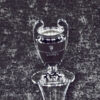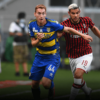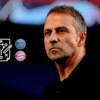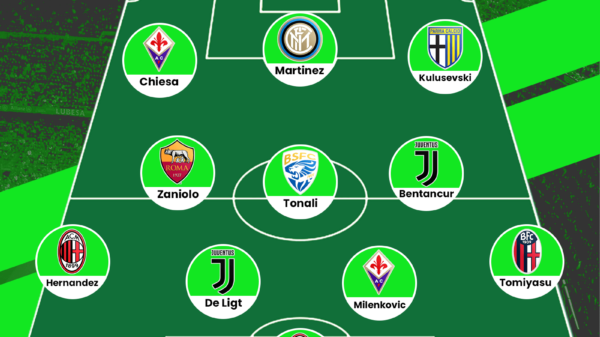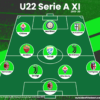Football Hipsters rejoice! Borussia Dortmund are into the Champions League final! Even more brilliantly for those ‘Bundesliga-philes’ out there, they are taking on league rivals Bayern Munich, a team many are tipping to claim Barcelona’s throne as the most exciting and dominant team in European football for the foreseeable future. ‘FC Hollywood’, as Bayern are known by many fans are exactly that – a team of stars to rival the great. As well as the stars on the field, the German champions also have the acclaimed stars on their shirt to display their European successes – 4 stars above the club badge to represent 4 European Cup triumphs. Dortmund on the other hand are still relative novices when it comes to Champions League. However, let’s not forget that despite having a more modest trophy cabinet, Borussia Dortmund have a Champions League title to call their own: 28th May 1997 still goes down as the greatest night in the club’s history so far. I thought with Dortmund’s 2nd Champions League final now on the horizon, this was as good a time as any to look back and reflect on that triumphant night.

Original image: dortmund.de
Pre-1997
For large parts of their existence the phrase ‘Borussia Dortmund: European Champions” would be as far-fetched a phrase as you could deliver. The Bundesliga was created in 1962 and has largely been dominated by FC Bayern with the Munich team winning the league title on 23 occasions with the latest coming this season, as they seized the crown away from Dortmund. Throughout the 1970s and 80s Bayern were particularly dominant domestically, as well as winning three consecutive European Cups between 1974 and 1976. Whilst Bayern were flexing their muscles as one of the greatest teams in European football history, Dortmund were leading a far more modest existence. The club won pre-Bundesliga titles in 56, 57 and 63 as well as defeating Liverpool in the 1966 Cup Winners Cup final, but the 70s and 80s saw Dortmund establishing themselves as a run-of-the-mill, mid table club. The uneventful languishing at mid-table would be Dortmund’s default setting until the arrival of a ‘Golden Age’ brought about by the appointment of Ottmar Hitzfeld.
Hitzfeld arrived from Swiss side Grasshopper at a Dortmund team that had just finished in tenth place. Hitzfeld transformed Dortmund into a force in German and secured a second place finish for the club in his first season, coming agonisingly close to winning the league at the first attempt but only to be denied by Stuttgart.
Dortmund’s second place finish meant that the club qualified for the UEFA Cup, a competition which the club went all the way to the final in. Unfortunately for Die Schwarzgelben, they were confronted by an excellent Juventus team in the final and they were defeated 6-1 over two legs by ‘the Old Lady’ of Italy. Despite European disappointment, Dortmund continued to improve domestically and in 1995 Hitzfeld led Dortmund to their first ever Bundesliga, which was followed by a second a year later. With Germany conquered, Europe was in Hitzfeld’s and Dortmund’s sights.
The Road to the Final
By now, Dortmund had put a formidable team together starting at the back with Matthias Sammer, who won German Footballer of the Year in 95 and 96 as well as the 96 Ballon d’Or (the first defender to win since Bayern’s Beckenbauer in 1972). Alongside Sammer were similarly accomplished and experienced defenders in Stefan Reuter, Jurgen Kohler and Jorg Heinrich. During the summer of 1996, Dortmund recruited the Portuguese holding midfielder Paulo Sousa from current European Champions Juventus. To partner Sousa in midfield, Hitzfeld bought current Aston Villa manager Paul Lambert, a player Dortmund had encountered in a previous UEFA Cup campaign when the Scotsman was playing for Motherwell. The mercurial Andreas Moller (along with Kohler, a player signed from the Juventus team that defeated them in 1993 UEFA Cup final) acted as the club’s playmaker behind the potent strike force of Karl Heinz Riedle and the Swiss national Stephane Chapuisat. Throw in the likes of the young Lars Ricken, Michael Zorc (the club’s record appearance holder) and striker Heiko Herrlich amongst others and you have yourself a good squad. However, when compared to the squads of other Champions League clubs, the club were still outsiders to challenge for European honours.
The Champions League draw was made and the Borussians looked to have a good chance of getting through their group.
Group B
Atletico Madrid
Borussia Dortmund
Steaua Bucharest
Widzew Łódź
Dortmund’s 1997 Champions League campaign began with a home game against the Polish club Lodz, before travelling over to Bucharest to take on the 1986 European Cup winners Steaua Bucharest. Dortmund got through both games unscathed with a 2-1 home win and an impressive 3-0 win out in Bucharest; Herrlich grabbed himself three goals over the two games. Dortmund followed their triumphant trip to Bucharest with another away win at Atletico Madrid’s Vicente Calderon, before Atleti got their back with a 2-1 victory at the Westfalenstadion.
| Group B | Win | Lose | Draw | Goals For | Goals Against | Goal difference | Points |
| Atletico Madrid |
4 |
1 |
1 |
12 |
4 |
+8 |
13 |
| Dortmund |
4 |
1 |
1 |
14 |
8 |
+6 |
13 |
| Steaua Bucharest |
1 |
4 |
1 |
6 |
10 |
-4 |
4 |
| Widzew Lodz |
1 |
4 |
1 |
5 |
15 |
-10 |
4 |
Dortmund missed out on top spot in the group on goal difference, although they scored more goals than first place Atleti. However, it could be argued that the second place finish was a blessing in disguise for Dortmund as they avoided a strong Ajax team, who had won the trophy just two years before, and instead they found themselves against Guy Roux’s Auxerre at the quarter final stage. The Auxerre team, containing the likes of Alain Goma, Sabir Lamouchi and Taribo West, were comfortably beaten 3-1 at the Westfalenstadion, before Dortmund ensured it was job done with a 1-0 in the away leg. Next up: a semi final clash against Manchester United.
After their first forays into the Champions League, this was a Manchester United now finding it’s feet amongst the European elite and a pre-Sir Alex Ferguson was desperate to get to the final and win it just as the legendary United manager Sir Matt Busby had 49 years before. United had brushed aside Porto at the quarter final stage with a 4-0 aggregate win (all 4 goals coming in the first leg at Old Trafford) and the Manchester club were the favourites to progress to the final.
The United team who Dortmund found themselves confronted with was to be the core of the team who would go onto win the 1999 treble with the likes of Beckham, Keane, Giggs and Neville all playing as well as a young Paul Scholes featuring from the bench. However it was not United’s time yet and Dortmund gained a 1-0 advantage to take to the second leg at Old Trafford, where the continually improving Lars Ricken secured another 1-0 win to make it 2-0 on aggregate to the Germans and silencing Old Trafford in the process. Dortmund were in the final at Bayern Munich’s Olympiastadion.
The Final
In the mid-90s Italian football was certainly a superpower with highly impressive teams assembled at Inter, AC Milan, Lazio, Roma, Parma and Fiorentina. The chief power at the time, as with most of Serie A history, was Juventus – the 1996 European champions. Domestically they were also ruling Serie A with title wins in 1995 and 1997. Del Piero, Vieri, Deschamps, Peruzzi and, of course, Zinedine Zidane – Juventus had a stellar squad and the task facing Dortmund appeared to be enormous. The German press were in awe of the Juve team and many commented that the final was merely a consolation game for Dortmund. The fact that Dortmund were without former Juve defender Julio Cesar as well as the Sammer not being fully match fit added to the feeling amongst the press that Dortmund would stumble at the final hurdle. wrong they would be.
The first half saw Juventus playing all the football and demonstrating their strength – there were early signs that Juventus would go onto mirror their UEFA Cup victory over the German club just 4 years before. However, as the half got to the half hour mark, Dortmund came to life – or more accurately, Karl Heinz Riedle came to life. Juventus looked to have cleared a corner in the 29th minute only for the ball to be crossed back into the danger-zone by Lambert towards Riedle, who chested the ball down brilliantly before lashing home left footed from 6 yards.
Just under 5 minutes later Riedle doubled the lead by connecting with a powerful header from a corner. The quick fire goals should have stunned Juve but they acted in defiance and attempted to launch a fight back. Vieri fired a shot from 20 yards just past the top corner, after Zidane had hit the post moments before. Zidane was to have a frustrating night out overall, largely thanks to Paul Lambert. Lambert had regularly claimed that he was the least technically gifted player at the club, but he more than made up for his technical deficiencies with his work rate; this was more than prevalent in the Champions League final. Lambert was left with the unenviable job of man-marking Zidane, a player who would go onto become one of the greatest players ever – Lambert had him in his back pocket for the majority of the 90 minutes and the Scotsman played a huge part in scuffing out the Juve attack.
Juventus came out for the second half guns blazing with Zidane hitting the post from 18 yards, Vladmir Jugovic’s 20 yard shot being tipped around the post by Stefan Klos and a looping volley from Vieri being tipped onto the bar by the desperate outstretched hand of Klos. The second half also saw the introduction of Del Piero and it was to be the Italian, then aged 22, who would grab Juventus a goal in magical fashion. Del Piero let the ball roll through his legs to the onrushing Alen Boksic, who then played a ball across the 6 yard box to Del Piero to finish with a cute back heel flick past Klos. The Juventus fightback would last of all 6 minutes.
The 71st minute saw one of the all time great Champions League moments. Dortmund born and bred, the 20 year old Lars Ricken was being prepared to enter the fray. Ricken had made his debut as an 18 year old in 1994 and had been a first team regular from then on in. Arguably his personal highlight alongside winning two league tiles would have been his goal at Old Trafford to see Dortmund comfortably into the final. However, he was about to eclipse that moment. Only seconds after jogging onto the field, Dortmund launched a counterattack with Andreas Moller threading a through ball through the Juventus back line to Ricken who’s fresh legs saw him bomb clear of the defenders around him; still 20 yards away from goal Ricken audaciously chipped the ball over Angelo Peruzzi leaving him stuck to the floor as the ball sailed over his head to make it 3-1 to Dortmund and to effectively secure a Dortmund win. Ricken scored with his first touch just 16 seconds after coming onto the pitch – still the quickest goal ever scored by a substitute in the Champions League.
The third goal effectively killed off Juventus and Dortmund went on to secure their first ever Champions League title. It was also a history making night for Paulo Sousa, who became the first player in history to win back-to-back European Cups with two different teams having been part of the Juventus team who won the trophy in the previous year. Lambert also became the first British player to ever win a European Cup with a non-British club. The underdogs had triumphed and this should have been the catalyst for further Dortmund success, but it was unfortunately to be the end of the Hitzfeld’s ‘Golden Age’ and it was all to go tragically wrong for Dortmund. I’m not here to document the fall of Dortmund through the mid-2000s, as there are plenty of other places to read about that elsewhere; I’m here to celebrate the success of the unlikely 1997 Champions League winners. That Dortmund team still has to go down as one of my favourite European Champion winners ever thanks largely their underdog status and for their sudden emergence as a European force. It’s fair to say that following their decline, both on the field and financially, in the mid-2000s, that the club have struck back in incredible fashion thanks to inspired appointment of Jurgen Klopp and the club’s emphasis on breeding and developing young talent. Last time Dortmund won the Champions League they were considered the weaker teams, just as they will be when they come up against Jupp Heynckes’ Bayern team on 25th May at Wembley; last time Dortmund won the Champions League it was after being usurped as league champions by Bayern Munich following two consecutive years as German champions. Is fate on Dortmund’s side and can they mimic the class of 97? Personally, I hope so – and that’s not me attempting to blend in with the ‘football hispters.’
- Sorry, Chris: An Apology to Coleman - June 16, 2015
- 20 years on: Colombia’s original golden generation & subsequent Escobar tragedy - July 3, 2014
- World Cup Golden Boot: A Bony-fide Goalscorer - June 11, 2014




















































